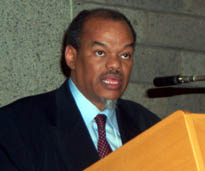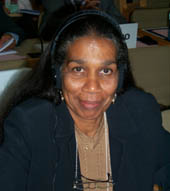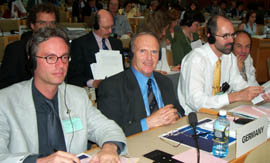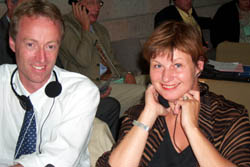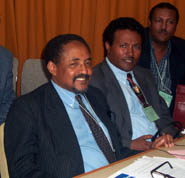 Canada, regretting that it could make no further financial commitment
at COP-5, said it would take the concerns expressed about the lack
of a finalized host country agreement to the highest levels of its
government
Canada, regretting that it could make no further financial commitment
at COP-5, said it would take the concerns expressed about the lack
of a finalized host country agreement to the highest levels of its
government
|
 On expert technical groups, Colombia
expressed concern that the core CBD budget does not include
resources for technical working groups on dryland, forest marine
and coastal. He also inserted language on scientific, technical
and technological matters related to marine and coastal genetic
resources.
On expert technical groups, Colombia
expressed concern that the core CBD budget does not include
resources for technical working groups on dryland, forest marine
and coastal. He also inserted language on scientific, technical
and technological matters related to marine and coastal genetic
resources. |
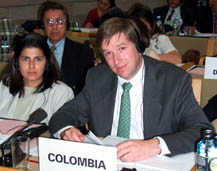 |
|
|
 Germany announced that it would host the open ended ad hoc
working group on access and benefit sharing in Bonn in late 2001.
Germany announced that it would host the open ended ad hoc
working group on access and benefit sharing in Bonn in late 2001. |
 New Zealand supported Colombia's call to coordinate budget and
working group decisions. She also called for the COP and SBSTTA
Bureaus to tackle the marine biodiversity issue without delay and
to give adequate time for consideration of a CBD Strategic Plan
during the intersessional period.
New Zealand supported Colombia's call to coordinate budget and
working group decisions. She also called for the COP and SBSTTA
Bureaus to tackle the marine biodiversity issue without delay and
to give adequate time for consideration of a CBD Strategic Plan
during the intersessional period. |
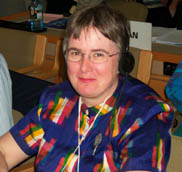
|
|
|
 The Netherlands extended an offer to host COP-6 in the Hague in
the second quarter of 2002 and delegates adopted a decision agreeing
to this (UNEP/CBD/COP/L.10). The Netherlands thanked Kenya for hosting
COP-5 and looked forward to meeting everyone again at COP-6.
The Netherlands extended an offer to host COP-6 in the Hague in
the second quarter of 2002 and delegates adopted a decision agreeing
to this (UNEP/CBD/COP/L.10). The Netherlands thanked Kenya for hosting
COP-5 and looked forward to meeting everyone again at COP-6. |
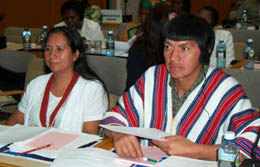  Esther Camac, Associacion Ixacavaa, spoke on behalf of the Indigenous
Peoples' Biodiversity Forum, emphasized the unfinished business
and true healing needed by recognizing the right of indigenous peoples
to be indigenous, repatriation of pre-CBD ex situ collections,
full control of their own resources, participation and recognition
at every level of CBD decision-making, prior informed consent and
the deny access to bioprospectors and those using traditional knowledge.
She also thanked African countries for their support of Article
8j and called on their recognition of Africa's indigenous peoples.
Esther Camac, Associacion Ixacavaa, spoke on behalf of the Indigenous
Peoples' Biodiversity Forum, emphasized the unfinished business
and true healing needed by recognizing the right of indigenous peoples
to be indigenous, repatriation of pre-CBD ex situ collections,
full control of their own resources, participation and recognition
at every level of CBD decision-making, prior informed consent and
the deny access to bioprospectors and those using traditional knowledge.
She also thanked African countries for their support of Article
8j and called on their recognition of Africa's indigenous peoples. |
 Sweden, on behalf of Western Europe and others (WEOG)
Sweden, on behalf of Western Europe and others (WEOG)
noted the smoothness of COP-5 and said the CBD was "coming
into maturity"
|
|
|
 Ethiopia, on behalf of the African Group, highlighted, inter
alia, the issue of repatriation of Africa's genetic resources,
the need for capacity development and poverty alleviation, public
awareness, participation of local communities in decision making,
protection of farmers' rights and opposition to the patenting of life
forms.
Ethiopia, on behalf of the African Group, highlighted, inter
alia, the issue of repatriation of Africa's genetic resources,
the need for capacity development and poverty alleviation, public
awareness, participation of local communities in decision making,
protection of farmers' rights and opposition to the patenting of life
forms. |
|
Brazil, on behalf
of GRULAC, said that funds are needed for regional meetings before
the next COP.
|
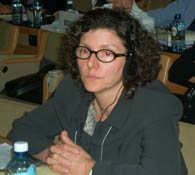 |
|
|
 Panama, on behalf of the Central American Countries urged strengthening
regional and sub-regional links.
Panama, on behalf of the Central American Countries urged strengthening
regional and sub-regional links. |
 Gudrun Henne of Greenpeace International noted its support for
work on the ecosystem approach and Article 8(j), the high level
of attention to biosafety and the CBD's responsibility to adequately
address the issue of forest biodiversity.
Gudrun Henne of Greenpeace International noted its support for
work on the ecosystem approach and Article 8(j), the high level
of attention to biosafety and the CBD's responsibility to adequately
address the issue of forest biodiversity. |
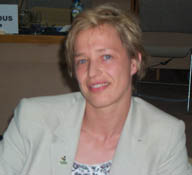
|
Closing statements:
|
|
 Klaus Töpfer, UNEP Executive Director [right], Töpfer
expressed his gratitude to all involved, called for the Cartagena
Protocol's entry into force prior to 2002 and remarked that of the
31 decisions adopted, UNEP is directly referred to in 14.
Klaus Töpfer, UNEP Executive Director [right], Töpfer
expressed his gratitude to all involved, called for the Cartagena
Protocol's entry into force prior to 2002 and remarked that of the
31 decisions adopted, UNEP is directly referred to in 14.
 Hamdallah Zedan, CBD Executive Secretary [center], noted
that more than 1500 participants attended, the highest number ever
for a CBD COP, and highlighted the meeting's business-like nature.
Hamdallah Zedan, CBD Executive Secretary [center], noted
that more than 1500 participants attended, the highest number ever
for a CBD COP, and highlighted the meeting's business-like nature.
 COP-5 President Francis Nyenze [left] expressed his honor
in presiding over the meeting, highlighted the signing of the Protocol
as a signal of the international community's commitment to the CBD
and introduced a short video capturing scenes of the meeting's past
two weeks. Nyenze officially closed the meeting at 2:10 pm.
COP-5 President Francis Nyenze [left] expressed his honor
in presiding over the meeting, highlighted the signing of the Protocol
as a signal of the international community's commitment to the CBD
and introduced a short video capturing scenes of the meeting's past
two weeks. Nyenze officially closed the meeting at 2:10 pm.
|
|
|
Post-COP interview: Schei
on COP-5, Forests, Ecosystems and Invasive Species
|
Peter Schei,
Chair of COP-5 Working Group1, shares his impressions of COP-5's positive
atmosphere, the 12 principles of the ecosystem approach, and the status
of progress on forest biodiversity and invasive species. He also discusses
priorities for CBD implementation in Norway.
 RealAudio of the interview
RealAudio of the interview |
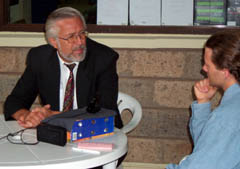
|
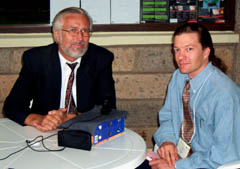
|
|
|
Post-COP
interview: Koester
on Panel 4, Biosafety and CITES
|
|
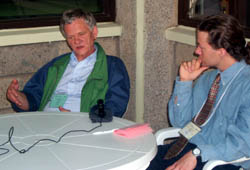 Veit Koester (Denmark), former Chair of the Biosafety Working Group,
speaks of the origins of the Biosafety Protocol in "the famous and
infamous Panel 4." Koester also gives his perspective on the practical
challenges of Protocol implementation at the national and regional
levels. Finally, he discusses public perceptions of biosafety and
compares the Biosafety Protocol with the CITES problematic of transboundary
movements of life forms.
Veit Koester (Denmark), former Chair of the Biosafety Working Group,
speaks of the origins of the Biosafety Protocol in "the famous and
infamous Panel 4." Koester also gives his perspective on the practical
challenges of Protocol implementation at the national and regional
levels. Finally, he discusses public perceptions of biosafety and
compares the Biosafety Protocol with the CITES problematic of transboundary
movements of life forms.
 RealAudio of the interview
RealAudio of the interview
|
|
|
Post-COP
interview: Shikango
on Article 8(j), Drylands and Southern Africa
|
|
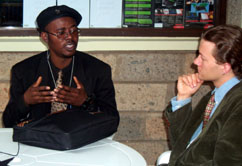 Sem Shikango (Namibia), Chair of the COP-5 Contact Group on drylands,
notes progress made on Article 8(j) and on the collective rights
of indigenous peoples and local communities as custodians of biodiversity.
He also discusses priorities for linking drylands and biodiversity
concerns in Namibia and Southern Africa.
Sem Shikango (Namibia), Chair of the COP-5 Contact Group on drylands,
notes progress made on Article 8(j) and on the collective rights
of indigenous peoples and local communities as custodians of biodiversity.
He also discusses priorities for linking drylands and biodiversity
concerns in Namibia and Southern Africa.
 RealAudio of the interview: PART
ONE PART
TWO
RealAudio of the interview: PART
ONE PART
TWO
|
|
|
Interview: Dorsey on Collective
Knowledge Rights and Access to Genetic Resources in the Andes
|
|
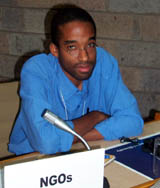 Michael Dorsey, Edmond's
Institute, critiques the imposition of property rights regimes
on biodiversity and describes challenges ahead in addressing the
collective knowledge rights of indigenous peoples. He also reports
on the status of implementation of Andean Pact legislation #391
on access and benefit-sharing in Ecuador, Venezuela and Peru.
Michael Dorsey, Edmond's
Institute, critiques the imposition of property rights regimes
on biodiversity and describes challenges ahead in addressing the
collective knowledge rights of indigenous peoples. He also reports
on the status of implementation of Andean Pact legislation #391
on access and benefit-sharing in Ecuador, Venezuela and Peru.
For related information
on model African draft legislation being developed through the Science
and Technology Commission of the Organization of African Unity on
access to genetic resources and collective farmers' rights, contact
Dr. Tewolde Berhan G. Egziabher, General Manager of Ethiopia's Environmental
Protectio Agency [sustain@telecom.net.et
or enypa@telecom.net.et]
or Ms. Meaza Demissie, Ethiopian Biodiversity Institute [bio_et@padis.gn.apc.org].
|
|
|
Interview: The CBD and
Sustainable Use in Madagascar (in French)
|
|
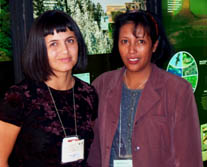 Claudine Ramiarison, Cellule de Valorisation de la Biodiversité,
Office National de l'Environnement
(ONE) [ramiarisonc@dts.mg],
gives her sense of where the CBD is going, described sustainable
use with respect to local communities and the resource itself. She
discusses francophone collaboration on medicinal plants and community-based
sustainable use of raffia and chameleons in Madagascar. She is
shown here, standing on the left, with ENB team member Nabiha Z.
Z. Megateli.
Claudine Ramiarison, Cellule de Valorisation de la Biodiversité,
Office National de l'Environnement
(ONE) [ramiarisonc@dts.mg],
gives her sense of where the CBD is going, described sustainable
use with respect to local communities and the resource itself. She
discusses francophone collaboration on medicinal plants and community-based
sustainable use of raffia and chameleons in Madagascar. She is
shown here, standing on the left, with ENB team member Nabiha Z.
Z. Megateli.
|
|
|
Interview: Edwards and Jenkins
on Sustainable Use, the CBD and CITES
|
|
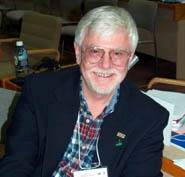 Steve
Edwards, Head of the IUCN Sustainable
Use Initiative [pictured here on the right] and Hank
Jenkins, Creative Conservation Solutions, share their impressions
of the CBD's development as a convention, and COP-5 progress on
the sustainable use of biodiversity. They reflect upon the complementarities
and differences between the CBD and CITES. Steve
Edwards, Head of the IUCN Sustainable
Use Initiative [pictured here on the right] and Hank
Jenkins, Creative Conservation Solutions, share their impressions
of the CBD's development as a convention, and COP-5 progress on
the sustainable use of biodiversity. They reflect upon the complementarities
and differences between the CBD and CITES.
 RealAudio of the interview: PART
ONE PART
TWO
RealAudio of the interview: PART
ONE PART
TWO
|


